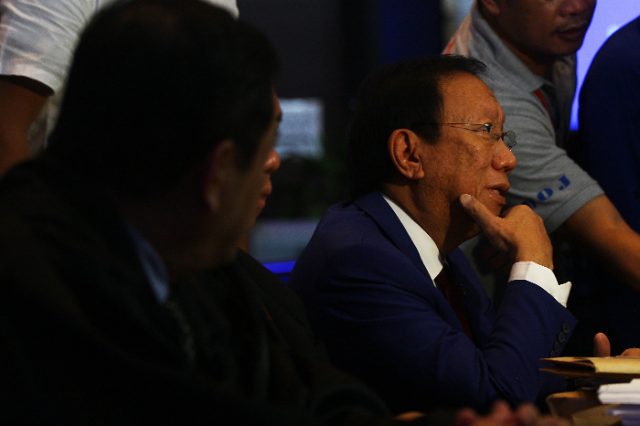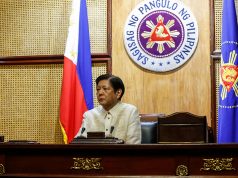
The Duterte administration is now using a legal measure to go after the country’s top broadcasting network ABS-CBN Corp. instead of waiting for Congress to bar the renewal of its legislative franchise to air.
President Rodrigo Duterte has been targeting the franchise of ABS-CBN since 2017, accusing the network of not airing his political advertisements during the 2016 presidential campaign.
He also accused ABS-CBN News of being too critical of him in its news reporting.
Earlier today, the government’s legal counsel, Solicitor General Jose Calida filed a quo warranto petition, the same remedy used to oust Maria Lourdes Sereno in 2018, to revoke ABS-CBN’s franchise due to alleged violations.
Sereno’s impeachment case was pending in Congress when the Office of the Solicitor General took it into its hands and argued, using the quo warranto mechanism, before the Supreme Court that her appointment as chief justice was void from the beginning.
This latest petition against ABS-CBN came a month before the network’s franchise ends. It is set to expire on March 30, 2020.
The move was also made even if the bills for the network’s franchise renewal are still pending in the 18th Congress.
If these bills are not signed into law by then, ABS-CBN would have to shut down its operations in radio and television.
For Calida, the company is not legally operating in the country because of the following reasons:
- It is supposedly owned by foreign investors.
- It is operating without a permit from the National Telecommunications Commission.
- It has an “ingenious corporate layering scheme” without Congressional approval.
However, ABS-CBN denied these allegations and dismissed the petition as the government’s new effort to deprive the public, particularly its viewers of news, entertainment and public service.
“These allegations cited by the Office of the Solicitor General in his press statement are without merit. ABS-CBN complies with all pertinent laws governing its franchise and has securing all necessary government and regulatory approvals for its business approvals,” part of its statement read.
"We did not violate the law."
READ: Statement of ABS-CBN on the Office of the Solicitor General's filing of quo warranto petition before the Supreme Court https://t.co/LuQmCEw5yy pic.twitter.com/SuxgebTaiN
— ABS-CBN News (@ABSCBNNews) February 10, 2020
Other tactics against ABS-CBN
In a rant against the water concessionaires Manila Water and Maynilad last December 4, Duterte suddenly mentioned the Lopez family, ABS-CBN’s owners.
He warned them that they should not expect the company’s franchise to be renewed anymore.
“ABS-CBN has been a protector of your vested interest. Your franchise will expire next year. If you are expecting it to be renewed, I’m sorry. You’re out,” he said.
These constant remarks prompted the National Union of Journalists to launch an online petition on Charge.org that sought one million signatures to back the call for Congress to renew ABS-CBN’s franchise before it expires.
Several talents from the Kapamilya network including Lea Salonga, Ogie Alcasid and Agot Isidro expressed support for the campaign.
Aside from public threats, Duterte also told the Lopez family to simply sell the company during his speech before the earthquake victims in Mindanao.
“Kung ako sa inyo ipagbili niyo na ‘yan. Kasi ang mga Filipino, ngayon lang makaganti sa inyong kalokohan. And I will make sure that you will remember this episode of our times forever,” the president said.
The suggestion came weeks after Davao-based businessman Dennis Uy, who also has close ties with the president, bared his new media and entertainment venture called the Udenna Communications Media and Entertainment Holdings Corp.
This would reportedly be in partnership or “close synergy” with the proposed third telecommunications company in the country, China Telecommunications Corp., which he leads.
An affront to constitutional guarantees
The National Union of People’s Lawyers said the quo warranto against the media giant revealed the government’s disrespect for the private entity’s rights of freedom of expression and public speech.
“Stripped of its legalese costume, it frontally circumvents Article III, Section 4 of the Philippine Constitution, which proscribes abridging the freedom of speech, of expression, or of the press. It also adversely affects the people’s right to information on matters of public concern enshrined in Section 7 of the Bill of Rights, not to mention parallel provisions in international law,” NUPL said on Facebook.
Press Statement10 February 2020Pressing FreedomToday, yet another quo warranto petition has been filed by the…
Posted by National Union of Peoples' Lawyers on Monday, February 10, 2020
The NUJP, meanwhile, pointed out that it is now up to the Supreme Court and the Congress to prove themselves as independent, co-equal branches of the government.
[Statement] Defend Press Freedom! Defend the People's Right to Know! #no2ABSCBNshutdownAnd so it has come to pass that…
Posted by National Union of Journalists of the Philippines on Sunday, February 9, 2020
Rep. Sol Aragones of Laguna, former ABS-CBN news reporter and one of the authors of the bill to renew the network’s franchise, took the side of the workforce who will be affected should the shutdown push through.
“With around 15 principal authors as well as a number of co-authors pushing for the renewal of the franchise of ABS-CBN, I’m confident that there is still time to sufficiently hear and pass it before Congress adjourns on March 11, 2020,” Aragones said.
“It’s important to take into consideration the 11,000 employees of ABS-CBN and their families as well as the public who patronizes the network,” she added.
According to Rule 66 of the Rules of Court, a quo warranto petition is a legal remedy or action to remove a person who “usurps, intrudes into, or unlawfully holds or exercises a public office, position or franchise.”
It can also be applied to an association, in this case, ABS-CBN, “which acts as a corporation within the Philippines without being legally incorporated or without lawful authority so to act.”









